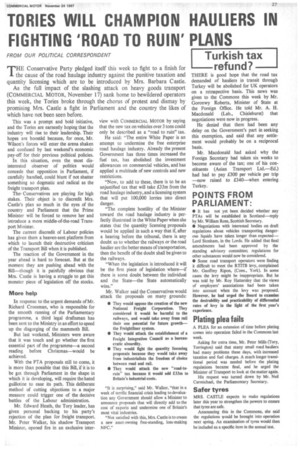TORIES WILL CHAMPION HAULIERS IN FIGHTING 'ROAD TO RUIN' PLANS
Page 29

If you've noticed an error in this article please click here to report it so we can fix it.
FROM OUR POLITICAL CORRESPONDENT THE Conservative Party pledged itself this week to fight to a finish for the cause of the road haulage industry against the punitive taxation and quantity licensing which are to be introduced by Mrs. Barbara Castle.
As the full impact of the slashing attack on heavy goods transport (COMMERCIAL MOTOR, November 17) sank home to bewildered operators this week, the Tories broke through the chorus of protest and dismay by promising Mrs. Castle a fight in Parliament and the country the likes of which have not been seen before.
This was a prompt and bold initiative, and the Tories are earnestly hoping that the industry will rise to their leadership. Their hopes are boostid because, for once, Mr. Wilson's forces will enter the arena shaken and confused by last weekend's economic pay-off for their previous political policies.
In this situation, even the most disinterested observer of politics would concede that opposition in Parliament, if carefully handled, could blunt if not shatter something so dogmatic and radical as the freight transport plan.
The Conservatives are playing for high stakes. Their object is to discredit Mrs. Castle's plan so much in the eyes of the country and Parliament that the Prime Minister will be forced to remove her and introduce a more middle-of-the-road Transport Minister.
The current discredit of Labour policies has given them a heaven-sent platform from which to launch their destructive criticism of the Transport Bill when it is published.
The reaction of the Government in the year ahead is hard to forecast. But at the moment they are pushing ahead with the Bill—though it is painfully obvious that Mrs. Castle is having a struggle to get this monster piece of legislation off the stocks.
More help
In response to the urgent demands of Mr. Richard Crossman, who is responsible for the smooth running of the Parliamentary programme, a third legal draftsman has been sent to the Ministry in an effort to speed up the disgorging of the mammoth Bill.
But last weekend, Ministers were aware that it was touch and go whether the first essential part of the programme—a second reading before Christmas—would be achieved.
With the PTA proposals still to come, it is more than possible that this Bill, if it is to be got through Parliament in the shape in which it is developing, will require the hated guillotine to ease its path. This deliberate method of cutting objections to a major measure could trigger one of the decisive battles of the Labour administration.
Mr. Edward Heath, the Tory leader, has given personal backing to his party's rejection of the plan for freight transport. Mr. Peter Walker, his shadow Transport Minister, opened fire in an exclusive inter view with COMMERCIAL MOTOR by saying that the new tax on vehicles over 3 tons could only be described as a "road to ruin" tax.
He said: "The entire White Paper is an attempt to undermine the free enterprise road haulage industry. Already the present Government has three times increased the fuel tax, has abolished the investment allowances on commercial vehicles, and has applied a multitude of new controls and new restrictions.
"Now, to add to these, there is to be an unjustified tax that will take £33m from the road haulage industry, and a licensing system that will put 100,000 lorries into direct danger.
"The complete hostility of the Minister toward the road haulage industry is perfectly illustrated in the White Paper when she states that the quantity licensing proposals would be applied in such a way that if, after a hearing before the tribunal, there is any doubt as to whether the railways or the road haulier are the better means of transportation, then the benefit of the doubt shall be given to the railways.
"When the legislation is introduced it will be the first piece of legislation where—if there is some doubt between the individual and the State—the State automatically wins."
Mr. Walker said the Conservatives would attack the proposals on many grounds:
• They would oppose the creation of the new National Freight Corporation. They considered it would be harmful to the railways, and would take away from rail their one potential for future growth— the Freightliner system.
• They would attack the establishment of a Freight integration Council as a bureaucratic absurdity.
• They would light the quantity licensing proposals because they would take away from industrialists the freedom of choice between road and rail.
• They would attack the new "road-toruin" tax because it would add £33m to Britain's industrial costs.
"It is surprising," said Mr. Walker, "that in a week of terrific financial crisis leading to devaluation any Government should allow a Minister to announce proposals that will directly add to the cost of exports and undermine one of Britain's most vital industries.
"Not satisfied with this, Mrs. Castle is to create a new asset-owning free-standing, loss-making NFC."












































































































































